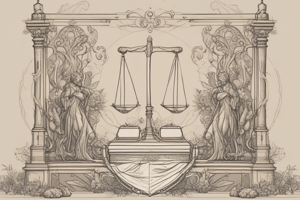Podcast
Questions and Answers
What is the primary point of conflict between Austin's theory and natural law theories?
What is the primary point of conflict between Austin's theory and natural law theories?
- Austin's theory states that law must align with habitual obedience, while natural law theory does not.
- Natural law theories emphasize social power dynamics, while Austin's theory focuses on compliance enforcement.
- Austin’s theory focuses on social factors, whereas natural law theories focus on the will of the sovereign.
- Natural law theories derive law from moral principles, whereas Austin's theory posits law emerges from sovereign commands. (correct)
How does Austin's theory relate to legal positivism?
How does Austin's theory relate to legal positivism?
- Legal positivism influenced Austin by emphasizing the importance of sanctions in shaping the legal system.
- Austin's theory contrasts with legal positivism by emphasizing moral principles over social factors.
- Austin's theory rejects legal positivism's central idea about the origin of law from the population's habitual obedience.
- Austin's work influenced legal positivism by highlighting the role of the sovereign's will in determining law. (correct)
What key components are central to legal positivism and Austin's theory?
What key components are central to legal positivism and Austin's theory?
- The influence of natural law principles in shaping legal systems through philosophical discussions.
- The relationship between the natural law, morals, and legal interpretation.
- The central role of ethical doctrines in sovereign will and subsequent legal frameworks.
- The influence of sanctions as tools and the importance of the law's habitual obedience from citizens. (correct)
What critical question does Austin's theory prompt?
What critical question does Austin's theory prompt?
According to Austin's theory, what is the most significant factor in the establishment of a legal system?
According to Austin's theory, what is the most significant factor in the establishment of a legal system?
According to the Austinian theory, what is the most critical factor for a command to be considered law?
According to the Austinian theory, what is the most critical factor for a command to be considered law?
What is the primary role of the 'sovereign' in Austin's legal positivism?
What is the primary role of the 'sovereign' in Austin's legal positivism?
A key limitation of the Austinian theory is its difficulty in dealing with laws that seem to lack explicit penalties. What type of laws are most challenging for this aspect of the theory?
A key limitation of the Austinian theory is its difficulty in dealing with laws that seem to lack explicit penalties. What type of laws are most challenging for this aspect of the theory?
Which concept is central to Austin's theory regarding how the sovereign maintains its authority?
Which concept is central to Austin's theory regarding how the sovereign maintains its authority?
According to Austin's theory, what characterizes the relationship between the sovereign and all other entities within the state?
According to Austin's theory, what characterizes the relationship between the sovereign and all other entities within the state?
What challenge does the Austinian theory face when addressing changes in the sovereign's occupancy or structure?
What challenge does the Austinian theory face when addressing changes in the sovereign's occupancy or structure?
How does Austin's theory limit its focus in terms of the basis of law?
How does Austin's theory limit its focus in terms of the basis of law?
What crucial aspect of lawmaking and law acceptance does Austin's theory, with its focus on coercive power, tend to overlook?
What crucial aspect of lawmaking and law acceptance does Austin's theory, with its focus on coercive power, tend to overlook?
Flashcards
What is a sovereign?
What is a sovereign?
The supreme authority in a society, habitually obeyed but not obeying anyone else.
What is a command?
What is a command?
A wish or order backed by the threat of punishment for disobedience.
What are legal sanctions?
What are legal sanctions?
Penalties or punishments for not following the law.
What is the habit of obedience?
What is the habit of obedience?
Signup and view all the flashcards
What is the Austin theory of command?
What is the Austin theory of command?
Signup and view all the flashcards
What is a limitation of the Austin theory regarding the sovereign?
What is a limitation of the Austin theory regarding the sovereign?
Signup and view all the flashcards
What is a limitation of the Austin theory regarding sanctions?
What is a limitation of the Austin theory regarding sanctions?
Signup and view all the flashcards
What is a limitation of the Austin theory regarding internal morality?
What is a limitation of the Austin theory regarding internal morality?
Signup and view all the flashcards
Austin's Command Theory
Austin's Command Theory
Signup and view all the flashcards
Natural Law Theories
Natural Law Theories
Signup and view all the flashcards
Legal Positivism
Legal Positivism
Signup and view all the flashcards
Habitual Obedience
Habitual Obedience
Signup and view all the flashcards
Sovereign
Sovereign
Signup and view all the flashcards
Study Notes
Overview of the Austin Theory of Command
- The Austin theory of command posits that law is a command issued by a sovereign backed by threats of sanction.
- It underscores the sovereign's power to enforce commands.
Key Elements of Austin's Theory
- Sovereign: The sovereign is the supreme power in a political community, habitually obeyed but not habitually obeying any other person or body.
- Command: A command is a wish or order backed by the threat of sanction. It must be enforceable through punishment or undesirable consequence for non-compliance.
- Sanctions: The threat of sanctions is crucial for a command to be considered law. Sanctions are the penalties for disobedience.
- Habit of Obedience: Habitual obedience to the sovereign is fundamental to maintaining their authority.
- Political Superior: The sovereign is superior to all individuals, institutions, or groups within the state, including judges, legislators, and other officials.
Limitations of Austin's Theory
- Difficulty in Defining the Sovereign: Identifying the sovereign in complex political systems is challenging due to varying power structures.
- Ambiguous Concept of Sanctions: The theory struggles to encompass laws addressing morality or social behavior that lack explicit sanctions. Sanctions range from fines to imprisonment or execution.
- Ignoring Internal Morality and Justice: Austin's theory overlooks internal morality and justice, which may influence acceptance of laws despite sanctions. Immoral laws might be disobeyed.
- Problem of Persistence of Law: The theory struggles to explain how laws remain valid even with changes in the sovereign or power structure.
- Focus on Coercive Power: Austin's theory undervalues consent, agreement, and acceptance in law, focusing solely on coercive power.
Relation to other theories
- Austin's theory contrasts with natural law theories which hold laws must align with moral principles, while Austin's views law as originating from commands.
- Austin's theory strongly influences legal positivism—the view that law is shaped by social factors, particularly the sovereign's will.
Conclusion
- Austin's theory, despite its limitations, remains a major contribution to legal theory, highlighting social power dynamics and sanctions. The sovereign as the central source of law and habitual obedience are key concepts. It prompts reflection on the interplay of law, power, and enforcement.
Studying That Suits You
Use AI to generate personalized quizzes and flashcards to suit your learning preferences.




